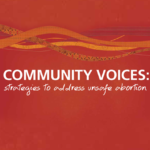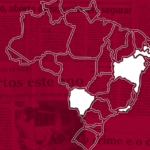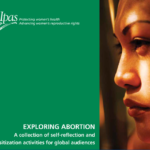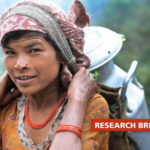In 2011, the UN Convention on the Elimination of All Forms of Discrimination Against Women (CEDAW) issued a groundbreaking decision in the case of Alyne da Silva Pimentel Teixeira versus Brazil involving the maternal death of a young Afro‐Brazilian woman.
In a ruling that marks a significant step forward for women’s rights in the region, Bolivia’s highest court, the Plurinational Constitutional Court, issued a decision ending the requirement for judicial authorization for women seeking legal abortion in Bolivia.
President Donald Trump reinstated the global gag rule in the first days of his presidency and expanded the restriction to all recipients of U.S. global health funds. Under the global gag rule, recipients of U.S. funds cannot provide abortion services, information, or referrals and are not allowed to advocate for abortion law reform. The impact of Trump’s uniquely restrictive global gag rule on women’s health and rights will be greater than the gag rule in the past.
The Youth Focused Social Network Initiative was a program to increase young women’s knowledge of and skills in accessing comprehensive abortion care in Rupandehi, Nepal from 2012-2014. The program trained peer educators to provide information and support related to comprehensive abortion care and encouraged adults to support youth in their communities. This study evaluated the effectiveness of the program and found that it had produced positive results in youth knowledge of and attitudes about comprehensive abortion care. Program expansion should be considered in light of continued need in Nepal.
Even as governments around the world are liberalizing their abortion laws, the vast majority of countries still legally require one or more healthcare providers to approve or perform abortion. Such requirements criminalize women who lack access to healthcare providers and seek abortion without one. Such women are often the world’s poorest and most marginalized women.
While the courts deliver pro-women judgements around abortions, parliament has delayed passing much-needed amendments to the MTP Act.
The objective of this study was to estimate the costs of public-sector abortion provision in South Africa and to explore the potential for expanding access at reduced cost by changing the mix of technologies used. It concludes that South Africa can provide more safe abortions for less money in the public sector through shifting the methods provided–and says that more research is needed to understand whether the cost of expanding access could be offset by savings from averting costs of managing unsafe abortions.
The pregnancy of a 10-year-old presents a complex and unprecedented situation but laws sensitive to the needs of the women and girls involved could make a world of a difference.
The objective of this study was to determine if pregnant, literate women and female community health volunteers (FCHVs) in Nepal can accurately determine a woman’s eligibility for medical abortion using a toolkit, compared to comprehensive-abortion-care-trained providers.
In a state where access to contraception, abortion and other reproductive health care is already hard to get, how likely are women to get that care in the wake of Hurricane Harvey?

This booklet describes Ipas’s community work with vivid stories and narrative from Ipas staff and partners in the field—from Ethiopia to Mexico.

This document gives a summary analysis of primary and secondary data documenting unsafe abortion and the impact of the criminalization of abortion on women’s lives and health and on health services in 5 Brazilian states: Mato Grosso do Sul, Rio de Janeiro, Bahía, Pernambuco, and Paraíba.

This collection contains five independent self-reflection and sensitization activities on abortion, some of which have been adapted from widely used sexual and reproductive health and rights (SRHR) exercises. They are effective in helping young people reflect on their abortion-related feelings and experiences, as well as in preparing young audiences for further discussions, values clarification, and skills-building related to abortion. Each activity description includes information about objectives, materials needed, timeline and advance preparations. This publication accompanies Abortion care for young women: A training toolkit (ACYTK-E11).

Since the liberalization of Nepal’s abortion law in 2002, intensive provider training and facility support have proven successful strategies for increasing the availability of comprehensive abortion care (CAC) services in the country. However, little is known about the pathways through which women access safe abortion services. This publication presents research on how women in Nepal access safe abortion information and services, including evidence-based recommendations indicating that increasing contraceptive education and access to female community health volunteers can improve women’s ability to manage their reproductive health.
Ending the silent pandemic of unsafe abortion is an urgent public-health and human-rights imperative. As with other more visible global-health issues, this scourge threatens women throughout the developing world. Every year, about 19–20 million abortions are done by individuals without the requisite skills, or in environments below minimum medical standards, or both.
This paper reports the results of an intervention with 3,471 abortion providers in India, Nepal and Nigeria. Following abortion care training, providers received in-person visits and virtual contacts by a clinical and programmatic support team for a 12-month period. The intervention also included technical assistance to and upgrades in facilities where the providers worked.
The Rohingya women and girls who have suffered sexual torture and humiliation and have now fled their homes most certainly deserve whatever care may alleviate some of their suffering. By not providing comprehensive reproductive health care, including contraception and safe abortion services, humanitarian agencies have taken a side, the side that opposes women’s human rights, the side that opposes science and common sense, the side that flies against established international agreements. Doing nothing speaks volumes.
This study aimed to support the development of a mobile phone intervention to support postmenstrual regulation family planning use in Bangladesh. It explored what family planning information women want to receive after having a menstrual regulation procedure, whether they would like to receive this information via their mobile phone, and if so, what their preferences are for the way in which it is delivered. Participatory interviews were conducted with 24 menstrual regulation clients in Dhaka and Sylhet divisions in Bangladesh.
This evaluation assesses the factors that influence contraceptive uptake among adolescents and young women seeking abortion care in health facilities. We analyzed client log book data from 921,918 abortion care cases in 4,881 health facilities in 10 countries from July 2011 through June 2015, and found that programmatic support to health systems, including provider training in contraceptive counseling and provision, was associated with women’s higher acceptance of postabortion contraception.
Numerous instances have been reported where women have been denied termination of pregnancy services for pregnancies arising out of rape, incest and sexual violence. There is also the rising issue of women and girls being forced by the police to keep the pregnancy in cases of incest or rape to preserve the infant to be used to retrieve DNA for evidence while prosecuting the perpetrator.

